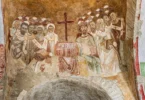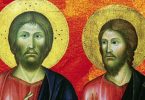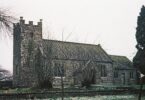The familiar Christmas story may not be as historically sound as you think.
by Tanner the Humanist.
Everyone agrees Jesus did his ministry in Nazareth; however, where he was born is another matter. Was Jesus really born in Bethlehem, or is that just another piece of the story everyone accepts because it’s what they’ve been told? What evidence actually backs it up, or is this just a tradition designed to fulfill a prophecy?
The Bethlehem Prophecy
The idea that the Messiah would be born in Bethlehem comes from the Jewish scripture, specifically the Book of Micah, a prophetic text from the Hebrew Bible.
But you, Bethlehem Ephrathah, though you are small among the clans of Judah, out of you will come for me one who will be ruler over Israel, whose origins are from of old, from ancient times — Micah 5:2
This verse, written several centuries before the birth of Jesus, became associated with the coming of a future leader or king who would restore Israel. Bethlehem, the birthplace of King David, Israel’s most revered king, was considered the ideal birthplace for a future Davidic king.
Do the Gospels Agree?
The first and the last gospels, namely Mark and John accordingly, show little interest in the birthplace of Jesus, not clarifying the discrepancy between Nazareth and Bethlehem as Jesus’ birthplace.
On the other hand, Matthew, a derivative of Mark, attempts to address the situation briefly. While he does not provide a detailed explanation for why Mary and Joseph were in Bethlehem when Jesus was born, it is implied that they were already residing there and later relocated to Nazareth after Jesus’ birth. However, in that case, why would Jesus call himself ‘Jesus of Nazareth’ rather than ‘Jesus of Bethlehem’ and undermine his claim to Messiahship?
Luke, another derivative of Mark written later than Matthew, also makes Bethlehem an issue that needs to be addressed. He explains that Joseph and the heavily pregnant Mary had to travel to Bethlehem because of a census requiring people to return to their ancestral homes. However, there are significant issues with Luke’s claim, as the Roman Empire never conducted a census that required such travel. If such a census had occurred, it would have caused a massive logistical disaster.
Some scholars argue that landowners might have needed to travel for a census, primarily conducted for taxation purposes, giving Luke’s story some plausibility. Yet, Joseph and Mary are portrayed as having limited means, and the suggestion that Joseph owned land in Bethlehem does not fit their situation. Moreover, no census corresponding to Jesus’ birth date has been recorded in Bethlehem.
Bart D. Ehrman, a renowned New Testament scholar, argues that these discrepancies suggest that the birth narratives were written more for theological than historical purposes. As he notes, ‘The idea of Jesus’ birth in Bethlehem was to show that Jesus was the Messiah, a descendant of David, but the accounts we have are not historically reliable.’
Geza Vermes, a prominent scholar on the historical Jesus, also describes these narratives as ‘theological constructions’ crafted to fit Jesus into the messianic mold anticipated by Jewish prophecy, rather than as historical accounts of actual events.”
Historical Evidence
When it comes to hard evidence, the well dries up quickly. There are no birth certificates or official records. We rely on the Gospels, written decades after Jesus’ death. However, the fact that we have little information about Jesus is not unexpected for a figure of the 1st century, and the fact that his ministry was not in a big city doesn’t help.
Before You Go
Most scholars agree that Jesus was born in Bethlehem, a small town in Judea, but there’s debate about how literal that is. Some think the stories about his birth were made up or exaggerated to fulfill prophecies. Others argue it’s a genuine tradition, though some suspect it’s just a way to tie him to King David’s lineage. So, while Bethlehem is the official story, there’s no solid evidence that it really happened like the Bible says.







